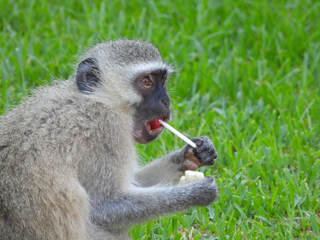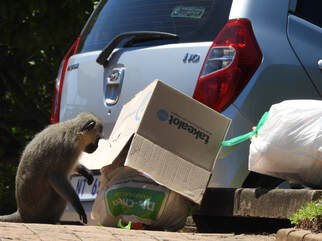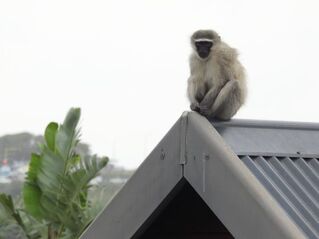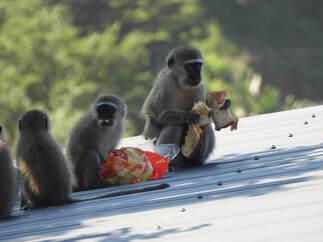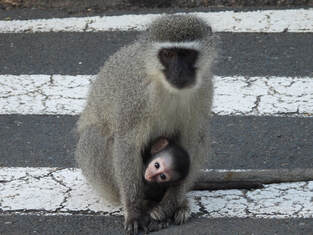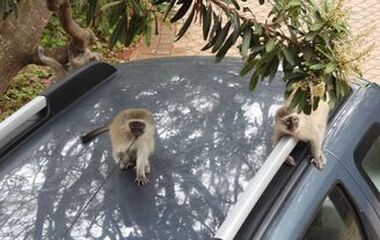© Stephanie Mercier
The UVP conducts research on a semi-urban population of vervet monkeys at Simbithi Eco-Estate: a unique, eco-friendly residential community that co-exists harmoniously with wildlife and nature in Ballito.
Today, urbanization is not only the most common but also the most extreme form of environmental change for wildlife. Whilst many species go extinct, we do not yet understand why some animals thrive in human altered environments. Renowned for their opportunistic diet and great behavioural flexibility, vervet monkeys adapt very well to fast-changing human-altered environments, such as residential and agricultural areas, where they often exploit human food sources. With increasing urbanization, interactions between humans and vervets have intensified, creating problems for both parties. At the UVP, we are studying which behavioural traits are involved in, or affected by successful adaptations in vervet monkeys, in order to understand and predict the ongoing impacts of urbanization on monkey populations. With our research, we aim at better understanding how different environments affect both cognitive and behavioural development in primates.
Today, urbanization is not only the most common but also the most extreme form of environmental change for wildlife. Whilst many species go extinct, we do not yet understand why some animals thrive in human altered environments. Renowned for their opportunistic diet and great behavioural flexibility, vervet monkeys adapt very well to fast-changing human-altered environments, such as residential and agricultural areas, where they often exploit human food sources. With increasing urbanization, interactions between humans and vervets have intensified, creating problems for both parties. At the UVP, we are studying which behavioural traits are involved in, or affected by successful adaptations in vervet monkeys, in order to understand and predict the ongoing impacts of urbanization on monkey populations. With our research, we aim at better understanding how different environments affect both cognitive and behavioural development in primates.
© Stephanie Mercier
By collaborating with the iNkawu Vervet Project, which lies within the same South African province of KwaZulu-Natal (Mawana Game Reserve), we can assess how urbanization is changing the behavioural repertoires of vervet monkeys, presenting a new comparative model system to study cognitive flexibility under anthropogenic changes in the primate taxa. To do so, we are using similar methods consisting of natural observations, field experiments and faecal samples for best possible systematic and empirical comparisons to be made.
One of the main goals of UVP is to also collect specific data around human-vervet interactions to investigate the impact of urbanization on the vervet monkeys' behaviour and cognition. Because the monkeys are sharing their habitat with the residents at Simbithi Eco-Estate, this co-existence also provides us an excellent study situation to integrate a citizen science approach to the field of primate cognition. Since the start of UVP in November 2022, the residents at our study site are actively involved in our data collection (see citizen science below).
One of the main goals of UVP is to also collect specific data around human-vervet interactions to investigate the impact of urbanization on the vervet monkeys' behaviour and cognition. Because the monkeys are sharing their habitat with the residents at Simbithi Eco-Estate, this co-existence also provides us an excellent study situation to integrate a citizen science approach to the field of primate cognition. Since the start of UVP in November 2022, the residents at our study site are actively involved in our data collection (see citizen science below).
Ongoing projects
Human-Vervet interactions
In this part of the project, we are interested in how elements of the urban environment (presence of dogs, bird feeders, water pond, community centres etc...) influence the behaviours of vervet monkeys. We are also interested to investigate how positive (receiving/stealing food), or negative (being chased) interactions with humans may impact the monkeys' ranging patterns. Collecting focal data on individuals from two target groups (Acacia & Savanna), we can address questions like how urban elements impacts behaviour throughout different life stages, and describe what elements attract the monkeys the most, or repel them the more efficiently. This part of the UVP is combining data sets gathered through our citizen science approach, as well as detailed focal follows.
© Stephanie Mercier
Citizen Science
|
Get involved! If you are a resident in Simbithi and you would like to take part in our research, please contact Stephanie or sign up in our WhatsApp group, all contributions are very valuable to us!
|
Since the vervet monkeys here are sharing their habitat with humans, we are closely collaborating with the residents living in Simbithi. The citizen science approach presents a significant part in our research, and we are truly thankful to have so many interested and collaborative people involved. This cooperation takes form in a variety of ways. First, through a WhatsApp group where we receive multiple data points daily from inhabitants and their monkeys' sightings. This offers us detailed information on the monkeys ranging routines and behaviours through the entire estate, giving us an idea about the number of troops present and the evolution of the whole population’s demography etc. Thanks to the active involvement of Simbithi residents, we can build up a large data base including data points and frequencies, that researchers alone couldn’t achieve. Second, by allowing us to walk near their properties: observing what happens there enable us to collect detailed ad libitum natural observations. Finally, through questionnaires we collected detailed data on the interactions between residents and the wildlife living around their property. This helps us to investigate what attracts monkeys to specific houses and what repel them from others, hopefully leading to useful advice in order to improve human-wildlife conflicts here and in South Africa.
|

